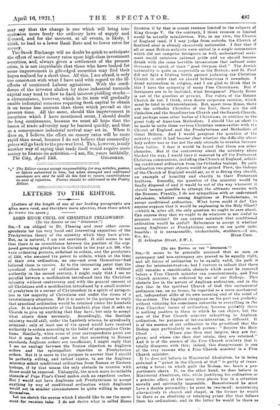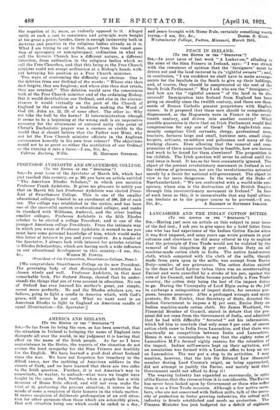(To rat EDITOR Of THE " SPECTATOR."1 SIR, It seems
to be generally assumed that as soon •as episcopacy and non-episcopacy are proved to be equally right,
and all forms of ordination to be equally valid, the path is clear for interministration; but I venture to submit that there still remains a considerable obstacle whiob must be removed
before a Free Church minister can conscientiously. qua Free Church minister, be ordained by one of our Bishops. This obstacle lies in the nature of Anglican ordination, and in the fact that in the spiritual Church of God this sacramental ordinance can, on no terms, be regarded as a mere mechanical act, independent alike of its own meaning and of the mind of the ordinee. The Anglican clergyman on his pert can probably without violating his conscience subscribe to everything in the Free Churches' forms of ordination, because probably there is nothing positive in them to which he can object, but the case of the Free Church minister submitting to Anglican ordination, for purposes of interministration, is different. It is of the essence of our ordination to the priesthood that tho Bishop says particularly to each person : " Receive the Holy Ghost . . . . Whose sins thou dost forgive, they are for- given; and whose sins thou dost retain, they are retained." And it is of the essence of the Free Church ministry that it totally disagrees with this; indeed, this disagreement is one of the very reasons why a Free Church minister is a Free Church minister.
If be does not believe in Ministerial Absolution, he in being ordained a " priest in the Church of God " is guilty of trans- acting a farce; in which guilt the Bishop, ton. bears a pro- portionate share. If, on the other hand. he does believe in Ministerial Absolution, this, while justifying his ordination as a genuine affair, at the same time places him in a situation morally and spiritually impossible. Henceforward he must have a double personality ; he must be two-faced : ministering alternatively in church and chapel, is the former he would be there as an absolving or retaining priest (for that follows from his ordination), and in the latter he would be there as the negation of it; more, as violently opposed to it. Alleged unity at such a coat to conscience and principle were bought at too great a price;'besides, there is enough insincerity both in doctrine and practice in the religious bodies already as it is. What I am trying to say is that, apart from the vexed ques- tion of episcopacy or non-episcopacy, ordination in what we call the historic Church has a different nature, a different intention, from ordination in the religious bodies which we call the Free Churches, and that this being so the Free Church minister could not accept ordination at a Bishop's hands with- out betraying his position as a Free Church minister.
Two ways of overcoming the difficulty are obvious. One is the deletion from our Ordinal of the words: " Whose sins thou dost forgive, they are forgiven; and whose sins thou dost retain, they are retained." This deletion would save the consciences both of the Free Church minister and of the ordaining Bishop. But it would decatholicise our Ordinal, and also in the circum- stances it would virtually on the part of the • Church of England be the creation of a tradition making the Word of God (St. John xx. 22, 23) of none effect. The other is Why not take the bull by the horns? If interministration (though it seems to be a beginning at the wrong end) is an imperative necessity for the attainment of outward unity (the point of Christ's Eucharistic prayer was a oneness so visible to the world that it should believe that the Father sent Him), why not let the Free Church minister officiate in the Anglican communion honestly in his own true colours? The objections would not be so great as either the mutilation of our Ordinal or the turning it into a farce.—I am, Sir, &c.,



































 Previous page
Previous page